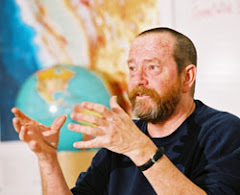FROM HERE TO THERE
“Sleeping Space” ©Doug Evans Betanco 2008
For La Tribuna (463 words)
In a chat on the porch in Glenwood Springs—I share a 3-story rental house full of private and communal spaces with three other single adults—Tex, one of my housemates, said, “I’ve chosen a room of my own for years. I need a place to close out the world, for solitude. A while back, in Utah, I lived in an unheated space in the basement all winter rather than share a warm master bedroom suite upstairs, even with my best friend: I need privacy, not a dorm.”
“Me, too. Even in my marriages,” I remarked, “I’d want a door I could close. Privacy’s an entitlement here, but not in nightly Nicaragua, where most people don’t want it.”
“Huh?”
“Listen, Tex. When I first visited Teote in 1993, in the house of my now-adopted peasant family, the Betancos, they gave me their only single room. The eight family members slept in the other cuarto, in hammocks, because I also had the only bed. Hosts in our Sister City were required to provide Brigadistas with privacy. Some couldn’t: their casas held no separate sleeping room. ‘Norteamericanos,’ they understood, ‘need space,’ whereas Nicaragüense ‘prefer company,’ especially when asleep.”
“In the fifteen years I’ve travelled south, I’ve always had a separate room, without asking. When I moved to my sister’s house south of town, near the campo, they’d built a space inside their sala with black plastic walls. Everyone else slept two to a bed in the other room, as usual, and they assured me they wouldn’t want it otherwise. ‘Too many ghosts in the night to sleep alone,’ they said. ‘How can you do it?’”
“Some of that,” said Ted, “might be hospitality. We shift beds to accommodate guests here, too.”
“Cultural diversity is working, as well, and it starts very early. Most everyone I know up here was raised from birth separated from their parents, even from other siblings; in Nicaragua, hardly any mother would sleep apart from her babies, and, as the children grow, they just shift from Mom’s bed to that of the kids, in the same room as their parents. No one’s ever heard of a playpen or a crib or a nursery, much less infant daycare. 24/7, family is holding the baby, until she’s walking and talking, and, then, there’s a family hand to hold.”
“That’s pretty different.”
“Maybe it’s because we stress self-sufficiency, while they push family solidarity: both are valuable, cultural-survival models. We can learn from each other to be independent and One: now, while I’ve built a private suite at my sister’s house, I leave the adjoining door ajar at night, just in case someone needs a talk or a cuddle. Up here, I’m a more open Dad and Pop-Pop, since I’ve shared my space with campesinos, deep in the heart of Nicaragua.”
Saturday, September 6, 2008
Subscribe to:
Post Comments (Atom)
















































































2 comments:
You're an introvert; of course you want your own room. In our house, there are three people with three separate rooms. That has nothing to do with me sleeping with them when they were babies, though. An introvert needs to move on to solitude. No es la verdad con todos los norteamericanos; casi todos son extrovertidos. But in Mexico, at least, it isn't so painful to be around other people because they are so welcoming. I assume that might be true in Teote as well.
Thanks for your comment. Yes, the people of Teote are vastly welcoming and open; they told me that "norteamericanos need space, whereas we prefer company when we sleep." It's certainly a big generalization, but my experience in Teote with both introverted and extroverted campesinos, almost all of whom share sleeping space, suggests a cultural cause beyond personality. The only people in Teote who sleep in separate rooms are young teenage mean, who build a room of their own with an outside entrance on to their houses when they are beginning to experiment with their sexuality; usually, though, this means they are not sleeping alone. It may be that sleeping with babies to the extent shown by Teotean parents does not lead to shared sleeping patterns (to more flexible bed/space/rules) and tighter families in adulthood; I'm trying to figure out why because our families up here are so often fractured and there is so much alienation. CD
Post a Comment